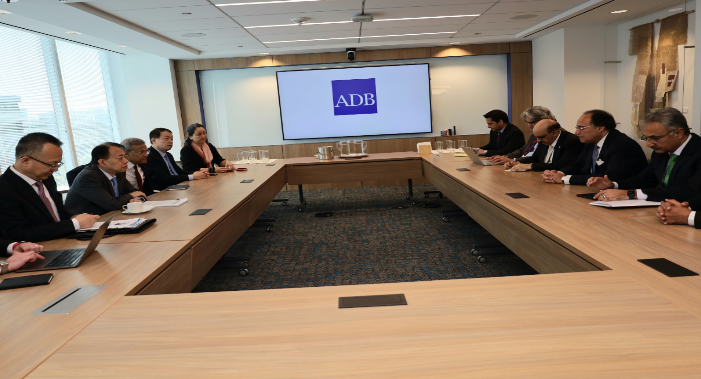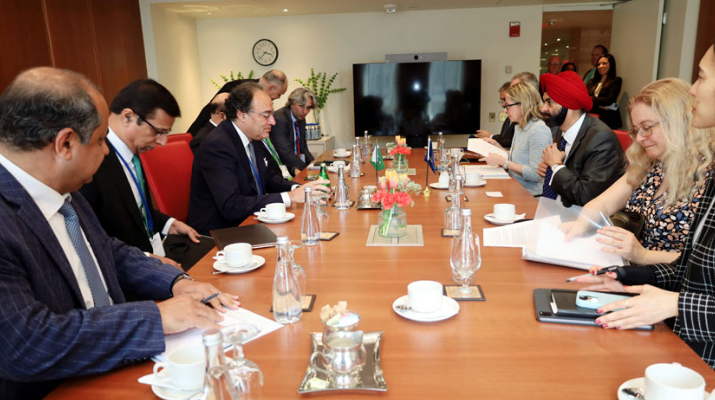Washington (Web Desk/Agencies): Leading global financial organizations like the World Bank (WB), Asian Development Bank (ADB) and International Finance Corporation (IFC) have assured their support for Pakistan’s initiatives aimed at economic stabilization through structural reforms, digital transformation and privatization efforts.
The assurance came during sidelines meetings of Federal Minister for Finance and Revenue Muhammad Aurangzeb, who is leading a Pakistan delegation in the IMF and World Bank-2024 Spring Meetings in Washington DC, with heads and representatives of the global lending institutions.
Talking to WB Group President Ajay Banga, the finance minister appreciated the bank’s continuous support to Pakistan in implementing its development agenda, highlighting the government’s commitment to advance significant reforms in taxation, energy and privatization sectors.
He underscored the importance of digital technologies to enhance governance and public service delivery, and asked the government was keen to work closely with the Bank to pursue the revenue reform agenda as well as timely investment in critical areas to help improve the domestic revenue mobilization.
Both sides agreed on the need for a rolling Country Framework Plan for 10 years.
Ajay Banga assured his full support for Pakistan’s reforms and digitalization programs to stabilize the economy.
The finance minister extended the invitation to the President to visit Pakistan at his earliest convenience.
Muhammad Aurangzeb, in his meeting with President of Asian Development Bank (ADB) Masatsugu Asakawa, appreciated organisation’s partnership with Pakistan to support its development agenda and address its emerging needs.

The finance minister highlighted the importance of ongoing projects and future collaboration, emphasizing the important role ADB’s support played in addressing macroeconomic imbalances, stabilizing the economy, boosting growth and achieving sustainable development.
ADB President Masatsugu Asakawa reaffirmed the bank’s commitment to support and assist Pakistan and expressed keen interest in working together to promote long-term, sustainable development in Pakistan.
Finance Minister Aurangzeb also met with CEO, US International Development Finance Corporation (DFC) Scott Nathan, highlighting his government’s commitment to attract investments across various sectors in Pakistan, including priority areas of agriculture, IT, extractive industry and renewable energy.
He hoped that the DFC would expand its portfolio in Pakistan following the resolution of outstanding issues and tap the significant investment opportunities by leveraging private-sector investments and public-private partnerships.
He also requested DFC’s assistance in the areas of debt financing, political risk insurance and capacity building to develop and implement potential DFC projects.
Nathan appreciated the progress made by Pakistan under the structural reforms agenda leading to macro-economic stabilization, emphasizing the importance of continuing to build on existing investments, while at the same time pursuing new opportunities.
In his meeting with Mohammed Al-Jadaan, Finance Minister of Saudi Arabia, the finance minister expressed gratitude for Kingdom’s steadfast financial support to Pakistan in times of economic challenges.
Both sides exchanged views on deepening economic and investment relations between the two countries. They also explored new avenues for collaboration to further strengthen trade and investment ties in diverse areas.
Speaking at at the V20 Ministerial Dialogue XII titled “Unlocking Growth and Prosperity through Innovations in Climate Finance and Debt,” the finance minister highlighted Pakistan’s vulnerability to climate-induced disasters, such as the 2022 floods that affected 33 million people and caused GDP losses, which approximately stood $15.2 billion.
He underscored that developed countries must fulfill their financial commitments and provide additional financing, technology transfer, and capacity-building assistance to developing countries including Pakistan to address the climate challenges.
He also underscored Pakistan’s efforts at COP 27 to establish the Loss and Damage Fund and emphasized the need for innovative financial solutions for climate emergencies.
In his meeting with Türkiye’s Treasury and Finance Minister Mehmet Simsek acknowledged historical, political, defense, cultural, and educational relations between Pakistan and Türkiye.
He stated that the current bilateral trade between Pakistan and Türkiye were not commensurate with existing potential.
Both sides agreed on the need to deepen cooperation by giving a fresh impetus to bilateral trade and investment and benefit from Turkiye’s experience in power generation and distribution.


